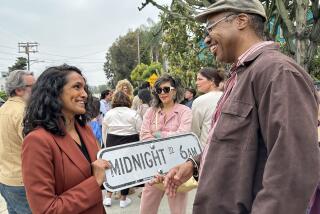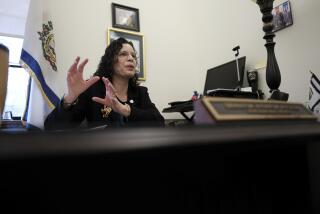Gay-Rights Bill Reflects Vermont’s New Attitude
- Share via
BURLINGTON, Vt. — A seventh-generation Vermonter, Jane Dwinell is making maple syrup as usual this spring, with a new sense of purpose. Ten percent of the proceeds will support a campaign that has pushed her state ahead of all others in extending rights to gays.
Occasional hate mail doesn’t deter her. She is confident in her convictions and proud of Vermont, where die-hard Yankee traditions coexist with some of America’s most progressive public policies.
“There’s a live-and-let-live feeling here, and a real sense of community,” said Dwinell, a Unitarian minister whose congregation in the small, far-north town of Irasburg includes more than a dozen gays.
“This is a rough place to be, and you need your neighbors,” she said. “If you go off the road in the winter, the next person who comes along is going to help you get back on.”
From the Civil War through the 1960s, Vermont was the most solidly Republican state. Politicians emulated native son Calvin Coolidge, economical with words and money.
The state’s image now is radically different. Its lone congressman, independent Bernie Sanders, is the former socialist mayor of Burlington. Its best-known company, Ben & Jerry’s, was founded by ex-hippies who promoted social causes along with gourmet ice cream. Its legislature stands alone in spurning a constitutional amendment to ban flag burning. Its environmental protection laws, including a ban on billboards, are among the nation’s toughest.
“I hope Vermont is looked at as the most progressive state in the country,” Sanders said from his Washington office.
“While people may not agree with everything Vermonters believe in, there’s a recognition that we’re sincere. . . . People respect that. For a very small state, we’re beginning to have a large impact on this country.”
Gays and lesbians nationwide felt the impact March 16, when Vermont’s House of Representatives voted, 76-69, for a bill that would gave same-sex couples all the rights and responsibilities granted to married heterosexuals.
Such partnerships are referred to as civil unions, not marriages, but the bill goes further than any legislation in the nation. It is now before the state Senate. Democratic Gov. Howard Dean has pledged to sign it.
To an extent, the bill symbolizes Vermont’s remarkable four-decade evolution into a liberal bastion. Yet Vermont’s traditions of tolerance and neighborliness--its reverence for both individualism and community--are as old as its founding motto: “Freedom and Unity.”
“There are some misconceptions that Vermont had always been a conservative state, but nothing could be further from the truth,” said Phil Hoff, who in 1962 became the state’s first Democratic governor in more than 100 years.
“It was conservative fiscally, but it has always been a very humanistic state,” he said. “There’s a kind of caring thoughtfulness that has been part of the people of Vermont all along.”
As an independent republic from 1777 to 1791, Vermont was the first of the former colonies to abolish slavery. Its foremost Republican leader of the 20th century--George Aiken--embraced New Deal initiatives as governor and later, as a U.S. senator, challenged his party’s support of the Vietnam War.
Vermont’s evolution was fueled by an influx of newcomers starting in the 1960s, when new interstate highways made its mountains and scenic towns more accessible. Communes sprouted in the backwoods; artists and writers emigrated from big cities. There was friction between these “flatlanders” and old-time Vermonters, but also common ground.
“Most of the newcomers didn’t come to make money,” said Jeff Weaver, a Vermont native who serves as chief of staff to Brooklyn-born Sanders. “They came because they wanted to share in the sense of community. It wasn’t a reversal of what Vermont was all about.”
Analyzing their state’s political distinctiveness, Vermonters cite its small size and small-town character. Its population of 594,000 is the smallest of any state except Wyoming. Its largest city, Burlington, has just 39,000 residents; two-thirds of its people live in towns of fewer than 2,500.
“Life is lived here on a human scale,” said Liz Bankowski, a former congressional staffer in Washington who now oversees Ben & Jerry’s social programs.
“We live in small communities and work in relatively small businesses,” she said. “You don’t get the sense of, ‘That’s where the rich people live, and that’s where the poor people live.’ On the same street will be the doctor and the trash hauler.”
Gay Vermonters say this aspect of Vermont has enabled them to personalize their equal-rights campaign.
“When you’re in a smaller environment, people find it harder to mistreat you,” said Jonathan Radigan, who hopes to marry his partner once the civil union bill becomes law. He moved from New York to Burlington in 1990 and still marvels at the ease with which Vermonters can engage their politicians.
“You really have access to them in an unprecedented way,” Radigan said. “You bump into them in the grocery store, and the next thing you know, you’re comparing prices of pineapples.”
Lois Farnham was born near Vermont’s border with Canada and reared on a dairy farm with 11 siblings. Now she is a plaintiff in the lawsuit that launched the civil union bill, seeking legal recognition of her 27-year partnership with Holly Puterbaugh.
Farnham, 55, is a school nursing supervisor, while Puterbaugh, 53, teaches math at the University of Vermont. Farnham jokes that her partner, who came from the Midwest in 1971, “can’t be a Vermonter if she lives to be 100,” but both are grateful to be where they are.
“I’m not surprised that of all the states, Vermont has done this,” Farnham said. “We’re independent thinkers. Vermonters are big on doing what’s right for individuals.”
Not all Vermonters embrace the changes. Henry Carse, an 81-year-old cattle farmer and former legislator from Hinesburg, says today’s lawmakers are more controlled by their party leaders and less in touch with the townspeople they represent.
He depicted the civil union bill as “pure political shenanigans,” steered through the House even though “the tremendous majority of this state is absolutely opposed to this stuff.”
Also dismayed are staff at the Roman Catholic Diocese of Burlington. Bishop Kenneth Angell was upset that more than 20 Catholic lawmakers supported the bill.
Gloria Gibson, communications director for the diocese, said some out-of-state opponents of gay marriage have turned virulently anti-Vermont. One Virginia man, she said, asked how to obtain a Vermont flag so he could burn it.
“I’ve always been proud to be from Vermont,” Gibson said. “But I feel we’ve been abandoned [by the government]. The majority of Vermonters have made their opinions on this issue very clear, and they’ve been blown off.”
Gibson, 56, recalled her high school days in Burlington, when she was one of only two students in her class openly backing John F. Kennedy for president in 1960 against Republican Richard M. Nixon.
“We were going to change the place,” she said. “But never in my wildest dreams did I think it would change so drastically. It’s a complete 360-degree turn.”
David Blow, 62, another lifelong Vermonter who helps the diocese maintain its archives, worries that if the civil union bill becomes law, “We may become, for gay marriage, the Reno of the Northeast.”
But he has no desire to leave Vermont and little nostalgia for the old days.
“The old-timers say, ‘We’ve lost the old Vermont, the simple life. Our taxes constantly go up.’ But as I think back, it was pretty darn dull as a young person,” Blow said.
“We’re changing, and that’s what’s fun.”
On the Net: https://www.state.vt.us
Gay rights site:
https://www.vtmarriageaction.org
More to Read
Sign up for Essential California
The most important California stories and recommendations in your inbox every morning.
You may occasionally receive promotional content from the Los Angeles Times.












